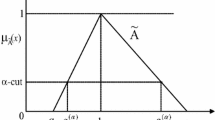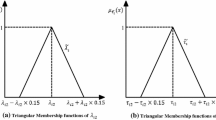Abstract
This paper discusses an engineering reliability model in fuzzy environment. As many reliability parameters are ill-defined or subjectively described using linguistic terms, the conventional measurement approaches cannot effectively handle the vagueness and ambiguity which exist within reliability parameters. However, fuzzy logic allows the extraction of precise conclusions based on vague human perceptions involved in reliability. In this research the authors have applied the fuzzy reliability evaluation approach to merit the input failure rates of the system. Fuzzy reliability index is evaluated with the help of the linguistic variables assessed by experts in the form of performance rating and importance weights of different parameters and multi-criteria decision making technique to measure the reliability of a system. The novelty in the paper is the assessment of the reliability index using fuzzy logic identifying the principal obstacles to improve the reliability level.



Similar content being viewed by others
References
Ansari SR, Mittal PK, Chandna R (2010) Multi-criteria decision making using fuzzy logic approach for evaluating the manufacturing flexibility. J Eng Technol Res 2(12):237–244
Cai K-Y (1996). Introduction to fuzzy reliability. Kluwer Academic Publishers Group, Boston, ISBN: 978-1-4612-8608-0 978-1-4613-1403-5
Chandna R, Ansari SR (2012) Comparison of fuzzy and multi-criteria decision making approach to measure manufacturing flexibility. Int J Sci Eng Res 3(5):1–9
Chen SJ, Hwang CL (1992) Fuzzy multiple attribute decision making methods and application. Springer, Berlin
Cheng C-H (1996) Fuzzy repairable reliability based of fuzzy Gert. Microelectron Reliab 36(10):1557–1563
Cheng C-H, Mon D-L (1993) Fuzzy system reliability analysis by interval of confidence. Fuzzy Sets Syst 56:29–35
Chowdhury SG, Misra KB (1992) Evaluation of fuzzy reliability of a non-series parallel network. Microelectron Reliab 32(1/2):1–4
Ebrahimipur V, Qurayshi SF, Shabani A, Maleki-Shoja B (2011) Reliability optimization of multi-state weighted k-out-of-n systems by fuzzy mathematical programming and genetic algorithm. Int J Syst Assur Eng Manag 2(4):312–318
Guan J, Wu Y (2006) Repairable consecutive k-out-of-n:F system with fuzzy states. Fuzzy Sets Syst 157:121–142
Guesgen HW, Albrecht J (2000) Imprecise reasoning in geographic information systems. Fuzzy Sets Syst 113:121–131
Guo H, Shi W, Deng Y (2006) Evaluating sensor reliability in classification problems based on evidence theory. IEEE Trans Syst Man Cybernet B 36(5):970–981
Jiang Q, Chen CH (2003) A numerical algorithm of fuzzy reliability. Reliab Eng Syst Saf 80:299–307
Karwowski W, Mital A (eds) (1986) Applications of approximate reasoning in risk analysis. In: Applications of fuzzy set theory in human factors. Netherlands, Amsterdam
Kumar A, Lata S (2012) Reliability evaluation of condensate system using fuzzy Markov model. Ann Fuzzy Math Inform 4(2):281–291
Lee-Kwang H, Lee JH (1999) A method for ranking fuzzy numbers and its application to decision-making. IEEE Trans Fuzzy Syst 7(6):677–685
Lin C-T, Chen C-T (2004) New product Go/No-Go evaluation at the front end: a fuzzy linguistic approach. IEEE Trans Eng Manag 51(2):197–207
Lin C-T, Chiu H, Tseng Y-H (2006) Agility evaluation using fuzzy logic. Int J Prod Econ 101:353–368
Liu Y, Li X, Yang G (2010) Reliability analysis of random fuzzy repairable series system, fuzzy information and engineering 2010. Adv Intel Soft Comput 78:281–296
Luo RC, Chen TM, Su KL (2001) Target tracking using hierarchical grey-fuzzy motion decision-making method. IEEE Syst Man Cybernet A 31(3):179–186
Malinowski J, Preuss W (1996) Reliability increase of consecutive k-out-of-n:F and related systems through components ‘rearrangement’. Microelectron Reliab 36(10):1417–1423
Mon D-L, Cheng C-H (1994) Fuzzy system reliability analysis for components with different membership functions. Fuzzy Sets Syst 64:145–157
Noore A, Cross PL (2005) Modeling the reliability of large distributed non-homogeneous networks. Inform Proc Lett 93:57–61
Onisawa T, Kacprzyk J (eds) (1995) Reliability and safety analyses under fuzziness. Physica, Heidelberg
Prasad MH, Reddy GR, Srividya A, Verma AK (2012) Reliability estimation of passive systems using fault tree approach. Int J Syst Assur Eng Manag 3(3):237–245
Ram M (2010) Reliability measures of a three-state complex system: a copula approach. Appl Appl Math 5(2):386–395
Ramachandran V, Sankararanarayanan V, Seshasayee (1992) Fuzzy reliability modeling-linguistic approach. Microelectron Reliab 32(9):1311–1318
Sharma RK, Kumar D, Kumar P (2005) Systematic failure mode effect analysis (FMEA) using fuzzy linguistic modelling. Int J Qual Reliab Manag 22(9):986–1004
Singer D (1990) A fuzzy set approach to fault tree and reliability analysis. Fuzzy Sets Syst 34:145–155
Singh VV, Singh SB, Ram M, Goel CK (2012) Availability, MTTF and cost analysis of a system having two units in series configuration with controller. Int J Syst Assur Eng Manag. doi:10.1007/s13198-012-0102-0
Utkin LV (1994a) Fuzzy reliability of repairable systems in the possibility context. Microelectron Reliab 34(12):1865–1876
Utkin LV (1994b) Knowledge based fuzzy reliability assessment. Microelectron Reliab 34(5):863–874
Verma AK, Ajit S, Karanki DR (2010) Reliability and safety engineering, 1 ed, Springer, London, ISBN: 978-1-84996-231-5
Wu D, Mendel JM (2011) Linguistic summarization using if–then rules and interval type-2 fuzzy sets. IEEE Trans Fuzzy Syst 19(1):136–151
Wu W, Huang H-Z, Wang Z-L, Li Y-F, Pang Y (2012) Reliability analysis of mechanical vibration component using fuzzy set theory. Maint Reliab 14(2):130–134
Zhang X, Pham H, Johnson CR (2010) Reliability models for systems with internal and external redundancy. Int J Syst Assur Eng Manag 1(4):362–369
Author information
Authors and Affiliations
Corresponding author
Rights and permissions
About this article
Cite this article
Chandna, R., Ram, M. Fuzzy reliability modeling in the system failure rates merit context. Int J Syst Assur Eng Manag 5, 245–251 (2014). https://doi.org/10.1007/s13198-013-0152-y
Received:
Revised:
Published:
Issue Date:
DOI: https://doi.org/10.1007/s13198-013-0152-y




